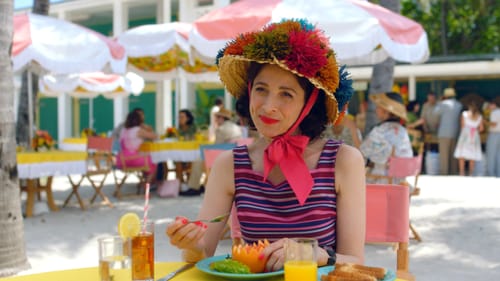Stay in the Loop
BSR publishes on a weekly schedule, with an email newsletter every Wednesday and Thursday morning. There’s no paywall, and subscribing is always free.
Not like other (((girls)))
Not so marvelous: Why I’m done with ‘Mrs. Maisel’

It’s a fraught time for Jews right now (just kidding, it’s always a fraught time for Jews), which got me thinking about a show everyone told me to watch: Amazon’s The Marvelous Mrs. Maisel. “You’ll love it,” they said. “I can’t believe you haven’t seen it yet,” they said.
And I finally caved, bingeing the first two seasons, and then, out of guilt (did I mention I’m Jewish?), the third. I did not love it.
TV comfort food
I suppose my friends like it for the same reason they like The Goldbergs, which premiered in 2013. This network sitcom (set in 1980s Jenkintown, PA) treads similar shticky ground and gets extra points for eastern Montco accuracy. Maisel and Goldbergs are comfort food, both harking back to a time when Jews ostensibly had the same backgrounds, aspirations, and sense of humor.
The Goldbergs even do a double harking, taking their name from a radio and Maisel-era television show featuring the lives of a tenement-dwelling couple led by Jewish matriarch Molly Goldberg. The show served to humanize Jews for the viewing public (and was, incidentally, the intellectual property of its star, Gertrude Berg), offering a Maisel-like blend of comedy and soap opera.
Can you believe she’s Jewish?
Not so the Maisel ensemble. It’s not just the Jewface casting. Neither Rachel Brosnahan’s Midge; her parents the Weissmans, played by Tony Shalhoub and Marin Hinkle; nor Luke Kirby’s Lenny Bruce are real-life Jews. But in a way, it really is the Jewface casting.
I don’t understand why casting directors still feel they can get away with subbing in anyone rather than insisting on representation and employing Jewish performers. We don’t accept yellowface Mikados or blackface Othellos (don’t get me started on Ken Ludwig’s Lend Me a Tenor). Why are we still okay with absenting Jews from our own stories?
Brosnahan, marvelous though she may be, plays the winningest Jewish girl ever, so winning that she never even needed a nose job or hair straightener in order to beguile and bewitch Jews and non-Jews alike. Nobody has ever told Midge, admiringly, “You don’t look Jewish!” Her shiksa best friend never parades her around a room, crowing, “Can you believe she’s Jewish?” The girls working B. Altman’s with her never feel her head for horns or make jokes about break-room food not being kosher.
Onstage in her stand-up, Midge quips that she’s not like the frigid Jewish girls of others’ jokes; she loves sex! She’s not like those uptight marriage-hounds in the Catskills; she gets a proposal from the resort’s most eligible bachelor surgeon and doesn’t even want it! Aside from this sly Jewish princess-bashing, there’s a generally ugly anti-feminist streak that crops up whenever women who aren’t Midge try to assert themselves (another glitch that’s halfheartedly addressed in a couple of third-season backstories).

Even less marvelous
Meanwhile, the show’s other principal family, the Maisels, all played by Jewish actors? Not so marvelous. They scream, cheat, talk money, lie. Alex Borstein’s Susie Myerson, Midge’s manager and devoted sidekick, is misgendered as a multi-season running joke and never deemed worthy of romantic feelings or even sexuality. Maybe she’s asexual. Who knows? Who cares?
What we do know: nobody would mistake Midge for a man. Those other Jews, the short, loud, grating characters who happen to all be played by Jewish people, they’re a shonda fur die goyim, as the Maisels might say, were any of the writers to allow them to express commonplace Yiddishisms of their day.
Why not put someone like Jenny Slate in the title role? Too Jewish? Nobody would believe a girl like that could get a life like this? Even in the context of the era’s German-Jewish snobbery, it’s hard not to notice the underlying sentiment in the show’s casting.
Erasing Jewish life
Even worse, the show’s active erasure of Jewish life in New York City reveals a startling ignorance of (or perhaps willingness to deny) that community’s connections. While much is made of Midge’s rabbi coming to Yom Kippur dinner, their specific synagogue is never mentioned. Jewish charities never materialize. The nascent Zionist project and its triumphs or woes don’t exist. Southern synagogue bombings don’t occur.
Sure, this is a comedy, but it’s also a show that purports to center Jewish experience. Anti-Semitic slights—casual or otherwise—and historic context are central to that experience. Jews aren’t just white people in Groucho masks. We come with a religion, shared and separate ethnicities, multiple cultural traditions, denominations, and beliefs.
I suppose the show’s writers attempted to answer some earlier criticism by adding a scene in the third season during which Midge, performing for the USO, steps onstage to sing “White Christmas” along with everyone else at the event.

A fellow performer asks Midge if she knows the words. She shyly whispers that she doesn’t because she doesn’t celebrate Christmas, and proceeds to mumble along, pretending. This moment illustrates the show’s failure better than any other. What completely assimilated, wealthy Ashkenazi Jew of 1960 Manhattan, for G-d’s sake, wouldn’t know the words to that song, or that it was written by a Jewish contemporary? There’s the joke!
“Of course I know the words,” she might have snapped. “Izzy Berlin lives right across the park!”
“Can we talk?”
I’m leaving out the show’s excision of racism, Lenny Bruce’s then-raging drug addiction, and the autonomy of the Weissmans’ Russian maid Zelda. Sure, it’s a comedy, but it’s comedy that exists in a world that existed.
One wishes Joan Rivers, the woman upon whom Midge is extremely loosely based, could offer up a final “Can we talk?” I suspect she’d breathe some of the fire she walked all over this show, and it would still be funnier than any of Midge’s improvised monologues. We had a real-world Midge Maisel, treated her like garbage for much of her life, and nevertheless, she persisted. Now that’s a show worth watching.
What, When, Where
Season 3 of The Marvelous Mrs. Maisel began streaming on Amazon Prime on December 6, 2019.
Sign up for our newsletter
All of the week's new articles, all in one place. Sign up for the free weekly BSR newsletters, and don't miss a conversation.

 Wendy Rosenfield
Wendy Rosenfield